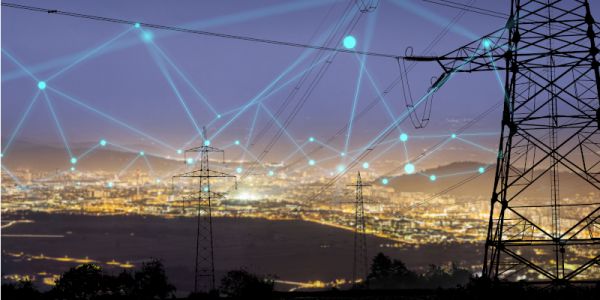Research project
EPSRC Fellowship - Applying thermodynamic laws to the energy-GDP decoupling problem
- Start date: 1 December 2018
- End date: 1 December 2023
- Funder: EPSRC
- Value: £1m
- Partners and collaborators: Calvin University, Michigan, USA; Instituto Superior Técnico, Lisbon, Portugal
- Primary investigator: Dr Paul Brockway
The project applies thermodynamic laws to examine a national and global problem: how can we decouple primary energy use from economic growth? - i.e reduce energy consumption to help mitigate greenhouse gas emissions, whilst allowing economies to grow to improve citizen well-being.
However, despite wide-scale energy efficiency policies and investment, at the global level no absolute decoupling (energy down, GDP up) has occurred. The vision for the fellowship is a better understanding the role of energy efficiency and energy rebound in the energy-GDP relationship, thereby improving the evidence base for primary energy reduction policies. Studying exergy flows through an economy enables thermodynamic-based quantification of both aggregate energy (exergy) efficiency and energy rebound.
The aim of my project is to build on momentum and insights from recent research – including my own – to complete world leading exergy-based research into the energy-GDP decoupling problem within an expanded international research network. Three key research questions are studied:
Q1. What is the relationship between energy efficiency and energy rebound?
Q2. How much primary energy will we need in the future to meet our energy service demands?
Q3. To what extent can we decouple primary energy use from GDP
Publications and outputs
• Hickel, J., Brockway, P., Kallis G., Keyßer L., Lenzen M., Slameršak A., Steinberger, J., Ürge-Vorsatz D., (2021) Urgent need for post-growth climate mitigation scenarios. Nature Energy 2021. Available at: https://doi.org/10.1038/s41560-021-00884-9
• Brockway P. E., Sorrell S.R., Semieniuk G., Heun M.K., Court V. (2021) Energy efficiency and economy-wide rebound effects: a review of the evidence and its implications. Renewable and Sustainable Energy Reviews 141, 110781. Available at: https://doi.org/10.1016/j.rser.2021.110781
• Tan, L.M., Arbabi, H., Densley-Tingley, D., Brockway, P.E., Mayfield, M. (2021) Mapping resource effectiveness across urban systems. npj Urban Sustainability, 1(20). Available at: https://doi.org/10.1038/s42949-020-00009-3
• Aramendia E., Brockway P.E., Pizzol M., Heun M.K., (2021) Moving from final to useful stage in energy-economy analysis: a critical assessment. Applied Energy, 283, pp.1-21. Available at: https://doi.org/10.1016/j.apenergy.2020.116194
• Pye, S., Broad, O., Bataille, C., Brockway, P., Daly, H.E., Freeman, R., Gambhir, A., Geden, O., Rogan, F., Sanghvi, S., Tomei, J., Vorushylo, I., Watson, J. (2021) Modelling net-zero emissions energy systems requires a change in approach. Climate Policy, 21(2), pp.222-231. Available at: https://doi.org/10.1080/14693062.2020.1824891
• Heun M.K., Marshall Z., Aramendia E., Brockway P.E. (2020) The Energy and Exergy of Light With Application to Societal Exergy Analysis. Energies 2020, 13, 5489. pp.1-24. Available at: https://doi.org/10.3390/en13205489
• Ver Beek N., Vindel E., Heun M.K., Brockway P.E. (2020) Quantifying the Environmental Impacts of Cookstove Transitions: A Societal Exergy Analysis Based Model of Energy Consumption and Forest Stocks in Honduras. Energies 2020, 13, 3206. pp.1-12. Available at: https://doi.org/10.3390/en13123206
• Andreou, A., Barrett, J., Taylor, P.G., Brockway, P.E., Wadud, Z. (2020) Decomposing the drivers of residential space cooling consumption in EU-28 countries using a panel data approach. Energy and Built Environment. Energy and Built Environment 1(4) pp. 432–442. Available at: https://doi.org/10.1016/j.enbenv.2020.03.005
• Marshall, Z., Brockway, P.E. (2020) A Net Energy Analysis of the Global Agriculture, Aquaculture, Fishing and Forestry System. Biophysical Economics and Sustainability 5:9, pp.1-27. Available at: https://doi.org/10.1007/s41247-020-00074-3
• Wiedenhofer, D., Virág, D., Kalt, G., Plank, B., Streeck, J., Pichler, M., Mayer, A., Krausmann, F., Brockway, P., Schaffartzik, A., Fishman, T., Hausknost, D., Leon-Gruchalski, B., Sousa, T., Creutzig, F., Haberl, H., (2020) A systematic review of the evidence on decoupling of GDP, resource use and GHG emissions, part I: bibliometric and conceptual mapping. Environmental Research Letters. Available at: https://doi.org/10.1088/1748-9326/ab8429
• Haberl, H., Wiedenhofer, D., Virág, D., Kalt, G., Plank, B., Brockway, P., Fishman, T., Hausknost, D., Krausmann, F., Leon-Gruchalski, B., Mayer, A., Pichler, M., Schaffartzik, A., Sousa, T., Streeck, J., Creutzig, F. (2020) A systematic review of the evidence on decoupling of GDP, resource use and GHG emissions, part II: synthesizing the insights. Environmental Research Letters. Available at: https://doi.org/10.1088/1748-9326/ab842a
• Ayres, R.U., Brockway, P.E., Aramendia E. (2019) The Key Role of Energy in Economic Growth. Oxford Bibliographies (online), Available at: https://doi.org/10.1093/obo/9780199363445-0121
• Tan, L.M., Arbabi, H., Brockway, P.E., Densley-Tingley, D., Mayfield, M. (2019) An Ecological-Thermodynamic Approach to Urban Metabolism: Measuring Resource Utilization with Open System Network Effectiveness Analysis. Applied Energy 254, pp.1-13, Available at https://doi.org/10.1016/j.apenergy.2019.113618
• Brockway, P.E., Owen A., Brand-Correa L.I., Hardt L. (2019) Estimation of global final stage energy-return-on-investment for fossil fuels with comparison to renewable energy sources. Nature Energy 4, 612–621. Available at: http://dx.doi.org/10.1038/s41560-019-0425-z
• Heun, M.K., Brockway, P.E. (2019) Meeting 2030 primary energy and economic growth goals: Mission impossible? Applied Energy 251, pp.1-24, Available at https://doi.org/10.1016/j.apenergy.2019.01.255
• Sakai, M., Brockway, P.E., Barrett, J.R., Taylor, P.G. (2019) Thermodynamic Efficiency Gains and their Role as a Key ‘Engine of Economic Growth’. Energies 2019, 12, 110. Available at https://doi.org/10.3390/en12010110


